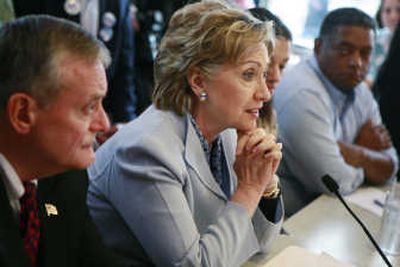Clinton, Obama force voters’ hand

HARRISBURG, Pa. – Voters in Pennsylvania rarely elect black and female candidates.
But they’ll have to choose one or the other in the April 22 Democratic presidential primary between Sens. Barack Obama and Hillary Rodham Clinton.
There’s no consensus explanation among political operatives and scholars for the political glass ceiling in this state, which currently has only one black and one woman in its 21-member congressional delegation and has never had a black or female governor. Only one black and one woman have ever sought the governorship on a major party ticket.
Some chalk it up to the parties’ failure to recruit more women and blacks and a tendency to favor incumbents over untested upstarts. Some theories hold that juggling families and political careers deters women from seeking full-time office or voters from choosing them. Some believe the concentration of blacks in urban areas works against black candidates for statewide office who must seek votes in predominantly white rural counties once famously compared to Alabama.
Pennsylvania’s voting-age population is more than 50 percent female and about 10 percent black, but neither group has comparable representation among top state and federal elective offices. One of the worst showings: Only 15 percent of the 253 seats in the Legislature are filled by women, leaving Pennsylvania 43rd nationally.
State Democratic Party chairman T.J. Rooney sees no “inherent bias” against black or female candidates. “The challenge that confronts candidates of any stripe is being able to put together the money and the organization,” he said.
But racial bias is still a reality in much of the state, said J. Whyatt Mondesire, state president of the National Association for the Advancement of Colored People. Outside Philadelphia and its suburbs, he pointed out, few minorities hold positions of power in county party organizations.
Gov. Ed Rendell, who backs Clinton, seemed to agree in February when he said some white Pennsylvanians would likely vote against Obama because he is black. Rendell said racial bias may have contributed 5 percentage points to his own 22-percentage-point victory in 2006 over Republican Lynn Swann, a former Pittsburgh Steelers star and the only black ever to run for governor for a major party.
When criticized for his remarks, Rendell added that Clinton faces similar obstacles because of her gender.
Rendell said both Clinton and Obama have done a good job overcoming stereotypes and Obama could benefit from his “ability to bring new voters into the electoral pool.”
Democratic registration in the state has soared over 4 million, the first time by any party.
Like blacks, women also say party organizations could do more to promote their candidacies.
Barbara Hafer, a former auditor general and treasurer, is the only woman to run for governor on a major party ticket. As the Republican nominee, she was soundly defeated by incumbent Gov. Robert P. Casey in 1990.
Hafer had to launch her own political career; she wasn’t recruited to be a candidate.
“You have to do it on your own, with your own family and friends,” Hafer said. “You cannot rely on party leadership.”